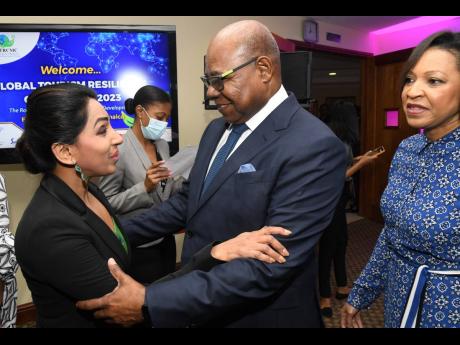Bartlett urges region to step up efforts to retain larger chunk of tourism dollar
WESTERN BUREAU:
While foreign direct investment has become the bedrock of tourism investment in the Caribbean, Jamaica’s tourism minister, Edmund Bartlett, is calling for more locals to be encouraged to invest in the industry and for the development of the small business sector in ensuring real growth.
Bartlett, who is co-chair and founder of the Global Tourism Resilience and Crisis Management Centre, said it cannot just be about arrivals, noting that economic growth that enhances the well-being of the people in the region is critical.
He was addressing delegates at the Global Tourism Resilience Conference at The University of the West Indies Regional Headquarters in St Andrew on Wednesday afternoon.
Having spent the better part of the last 40 years in the business, the Jamaican tourism minister argued that a new architecture that focuses on the supply side and the retention of the tourism dollar within the region is now needed.
Currently, the retention of the tourism dollar globally is averaging 20 cents. In the case of the Caribbean, it is between 15 at the lower end and 50 cents, argued Bartlett.
Accordingly, he wants these leakages plugged, primarily from the imports of goods and services that the industry requires, by boosting tourism linkages with other sectors of the economy.
“We must build out the capacity of the supply side, which provides for the consumption patterns of our visitors, within the recipient countries so that the wealth of tourism can reach the ordinary man in our communities,” he stressed.
He pointed out that a broad range of investment opportunities exists and asked delegates to imagine what it would be if all the beds, sheets, pots, pans, kettles, and food needed for the regional tourism industry were produced and supplied regionally.
“Consequently, we must pay more attention to building the capacity of small and medium tourism enterprises, which drive 80 per cent of tourism activity, but unfortunately, benefit from 20 per cent of the wealth from the sector,” he charged.
Bartlett pointed out that it cannot be business as usual if the Caribbean intends to maintain its current post-pandemic growth trajectory or if it is serious about building a sustainable, resilient, and inclusive tourism industry that benefits the region’s citizens.
“Likewise, it cannot be business as usual if the Caribbean is to sustain its competitive advantage in the global tourism market. It is within this context that it becomes essential that we create the framework for the sustainable and resilient growth of Caribbean tourism,” he noted.
His comments come in the wake of plans by new and existing investors to spend close to US$2 billion to add new rooms to Jamaica’s tourism product over the next four years. This will result in some 8,500 new rooms and more than 24,000 new part-time and full-time jobs as well as at least 12,000 construction jobs.
It also comes at a time when the economic spin-off has resulted in the island’s farmers earning $330 million through the Agri-Linkages Exchange project, through which more than 1,100 of them sold produce to the hospitality industry last year.
Bartlett added that the future fortunes of Caribbean tourism lie in economic convergence between complementary economies.
The tourism minister noted that the sector is becoming increasingly exposed to volatility and disruptions arising from a range of both traditional and non-traditional threats, including natural disasters, climate change and global warming, terrorism, insecurity and political instability, cyber vulnerabilities, economic recession, epidemics, and pandemics.
“Indeed, tourism is affected by almost every global shock,” he concluded.
Prime Minister Andrew Holness, who gave the keynote address, underscored the need to strengthen linkages between tourism and other sectors.
“Tourism acts as a catalyst for economic growth and development mainly through its induced economic impact through the creation of vital linkages with several other segments of national economies … . As part of building the sustainable and resilient tourism, which we all want, these linkages must be strengthened and the net value added to local economies from tourism enhanced,” Holness stated.

